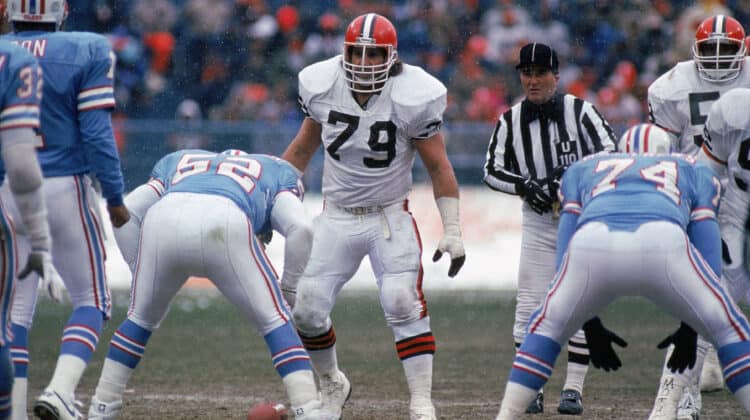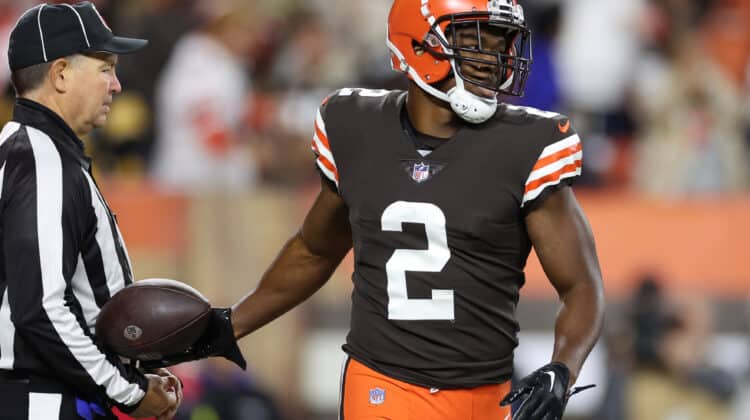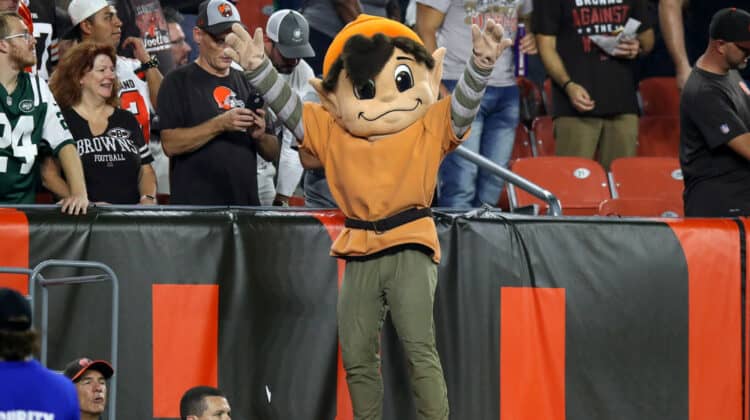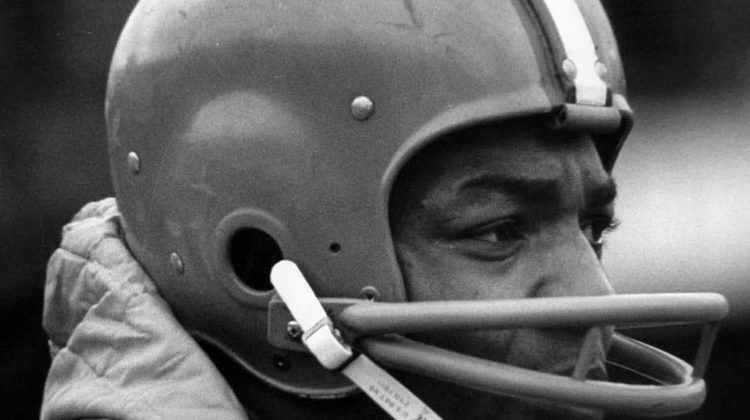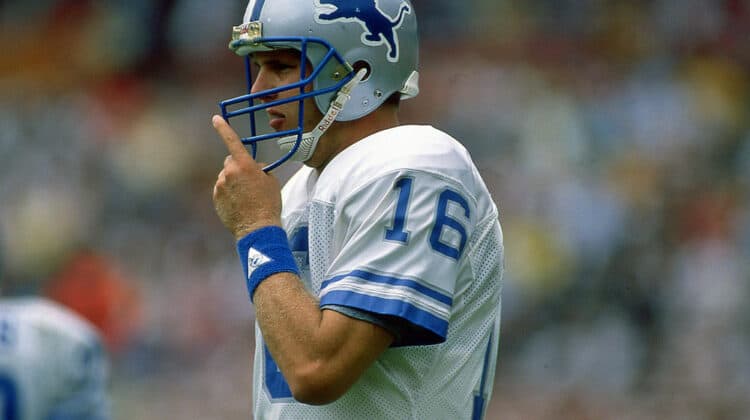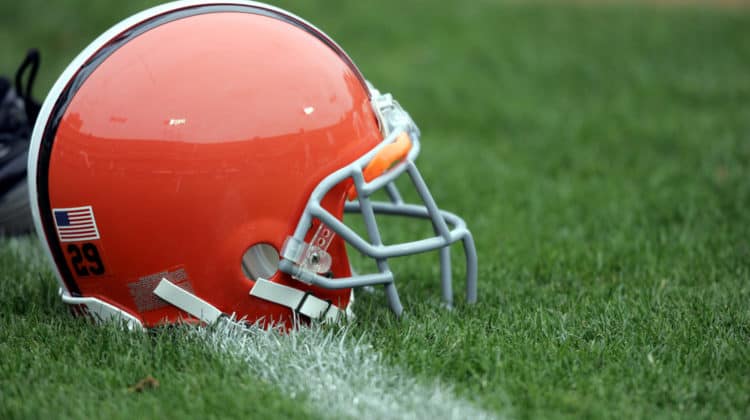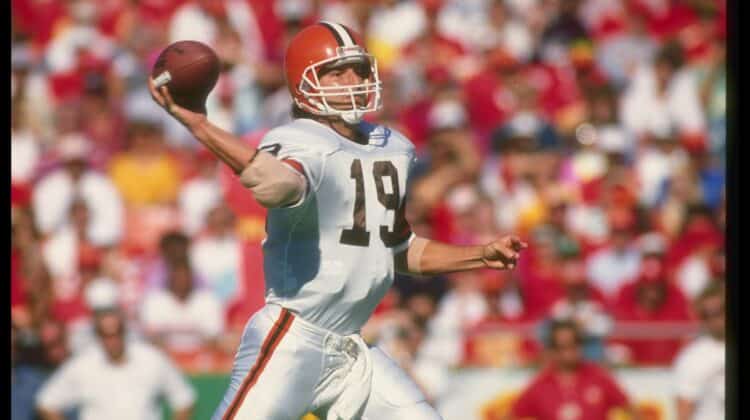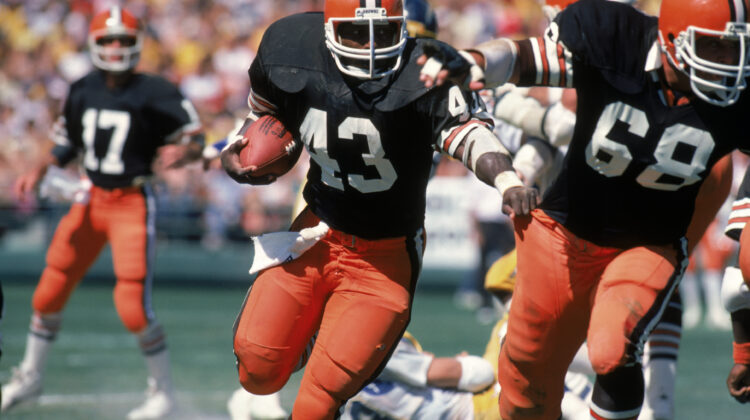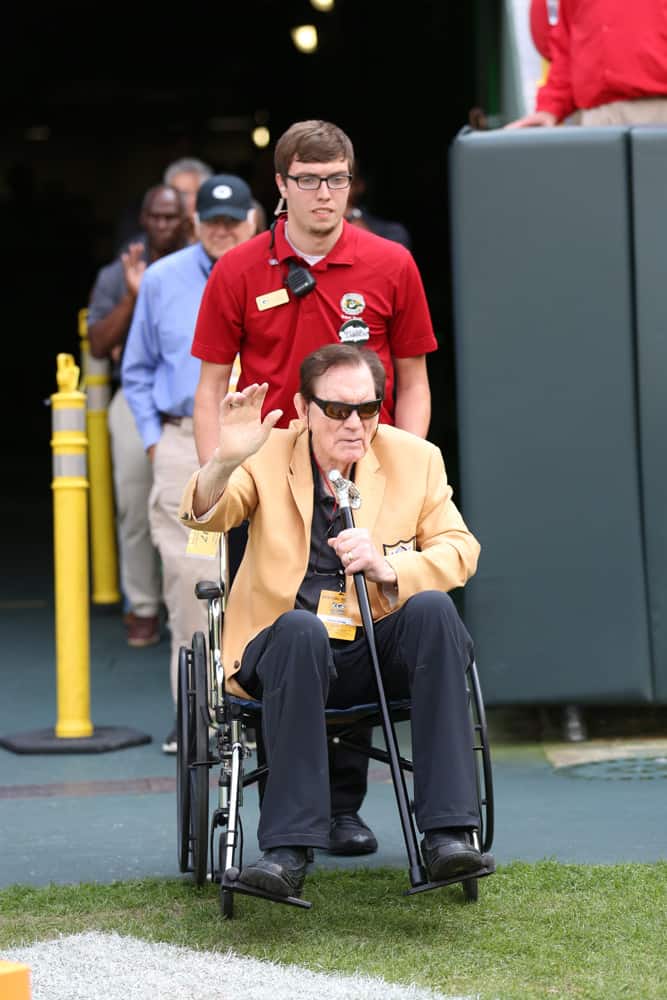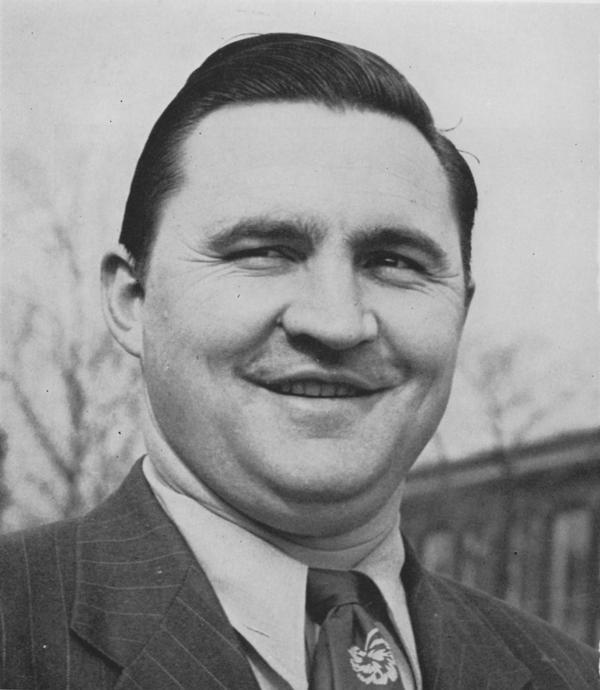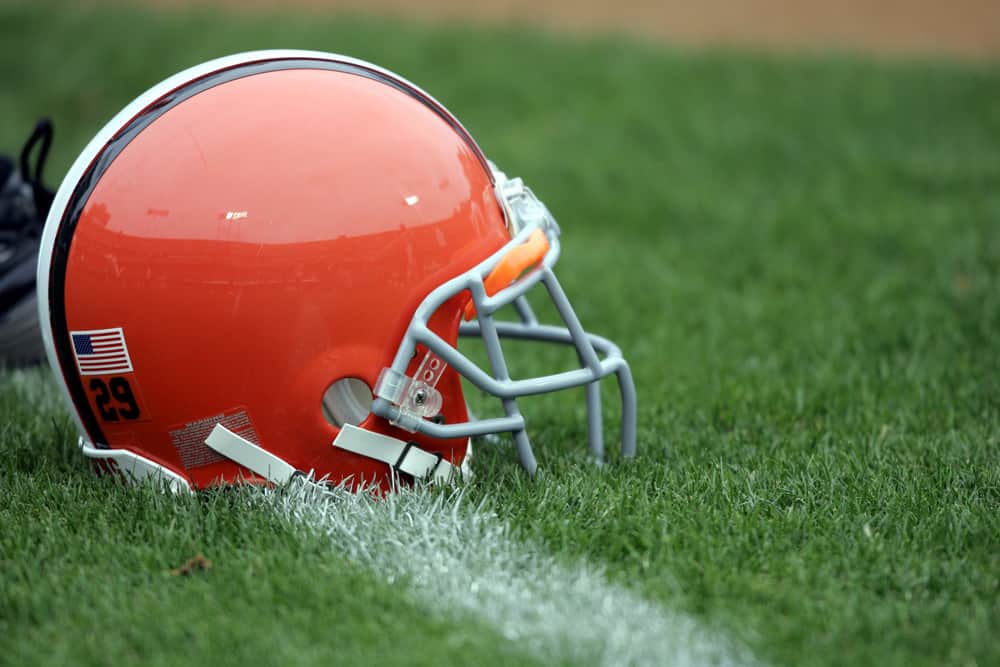
Versatility is an important quality for any athlete.
If a player can help a team in multiple roles, the player will be more valuable to the team.
Johnny Brewer displayed significant versatility for the Cleveland Browns, starting on both offense and defense for the team during his career.
After serving as Cleveland’s tight end from 1962 to 1965, including on its NFL championship team in 1964, Brewer moved to the right linebacker position in 1966 (when he was invited to the Pro Bowl) and 1967.
1964 Cleveland @Browns Players. Source: @Cleveland_PL Sports Research Ctr. 1964 Championship Program. pic.twitter.com/wpBtAgedoo
— John Skrtic (@SkrticX) July 28, 2018
We take a look at the life of Johnny Brewer – before, during, and after his NFL playing career.
The Early Years Through High School
Johnny Lee Brewer was born in Vicksburg, Mississippi on March 8, 1937.
Vicksburg is located in western Mississippi, near the Mississippi-Louisiana border.
When Brewer was growing up there, Vicksburg had a population of approximately 25,000 people.
George and Ruby Brewer were Brewer’s parents.
Brewer had five sisters and one brother.
From 1952 to 1955, Brewer attended Redwood High School in Redwood, Mississippi (about 10 miles from Vicksburg).
About his father, Brewer’s son, Sean, said:
“To get to school every day in Redwood, he hiked a gravel trail and crossed the Yazoo River on a ferry. As a teen, before school each morning, he had to pull up fishing nets and, as a senior, he drove the school bus.”
While at Redwood High School, Brewer earned 15 letters – five in football, four in basketball, three in baseball, and three in track.
Brewer’s football coach at Redwood High School, J.C. Dorman, described Brewer as follows:
“He was a football coach’s dream. You just put him on the field and he did the rest. I would not hesitate to put him on the football field at any position.”
While Brewer was originally planning to attend the University of Southern Mississippi, he ultimately was convinced by alumni of the University of Mississippi (“Ole Miss”), including from the Vicksburg area, to attend Ole Miss in Oxford, Mississippi.
College Years
At Ole Miss, Brewer, principally playing at tight end and on the defensive line, earned letters in football in 1957, 1959, and 1960.
In 1957, Brewer caught three passes for 37 yards.
Ole Miss had a 9-1-1 record in 1957, including a 39-7 victory over Texas in the Sugar Bowl on January 1, 1958.
In the final Associated Press poll for 1957, Ole Miss was ranked seventh in the nation.
In 1958, Brewer had knee surgery and missed the season.
Brewer, in 1959, became a starter and caught nine passes for 128 yards.
He was named second team All-SEC by the Associated Press in 1959.
Ole Miss was ranked second in the nation in the final Associated Press poll in 1959.
It posted a 10-1 record, including a 21-0 shutout of LSU in the Sugar Bowl on January 1, 1960.
In 1960, Brewer again started and caught seven passes for 124 yards and five pass reception touchdowns (tied for the lead in the SEC).
Three of these pass reception touchdowns came in a single game – a 26-13 Ole Miss victory over Tulane on October 15, 1960.
Brewer was named third team All-American by the American Football Coaches Association and United Press International in 1960.
In addition, he was named first team All-SEC by the Associated Press and United Press International in 1960.
Former Ole Miss and NFL player Kayo Dottley said about Brewer:
“He was just a natural athlete, a real physical specimen. . . . He could run like a deer. Half of the guys he played against didn’t even come up to his waist. Anything he wanted to do athletically, he’d do. . . . Even in college, he was like a man among boys. He had three guys on him and he flopped them off him like a dog shaking fleas off.”
In 1960, Ole Miss again was ranked second in the nation in the final Associated Press poll.
Ole Miss had a 10-0-1 record, including a 14-6 defeat of Rice in the Sugar Bowl on January 2, 1961 (the third Sugar Bowl victory for Ole Miss while Brewer played on the team).
After the 1960 season, Brewer played in the Chicago All-Star Game, the Senior Bowl, and the Coaches Association All-America Bowl before continuing his football career in the NFL.
The Pro Football Years
1961-1964
The Cleveland Browns drafted Brewer in the fourth round of the 1960 NFL draft (as the 41st overall pick).
Cleveland also drafted Ole Miss players Bob Khayat and Bobby Franklin in its 1960 draft.
Brewer joined the Browns for the 1961 season.
Playing at a height of six feet and four inches and a weight of 230 pounds, Brewer appeared in all 14 regular season games for the Browns in 1961.
In 1961, Brewer did not start any regular season games nor have any pass receptions.
He was credited with one-half of a sack on defense and two return yards on a kickoff in 1961.
The Browns had an 8-5-1 record and finished in third place in the NFL East Division in 1961.
In 1962, Brewer became a full-time starter at tight end, starting all 14 regular season games.
On September 23, 1962, in a 17-16 Cleveland loss to the Washington Redskins, Brewer had his first NFL regular season pass reception.
Brewer caught four passes for 58 yards.
In a 34-7 Cleveland victory over the St. Louis Cardinals on October 21, 1962, Brewer scored his first NFL regular season touchdown on a 37-yard touchdown pass from Browns quarterback Jim Ninowski.
Brewer caught four passes for 73 yards.
The following week, on October 28, 1962, Brewer’s play helped Cleveland gain 354 total yards and score 41 points, in a 41-14 Browns win over the Pittsburgh Steelers.
In a 45-21 Browns loss to the Dallas Cowboys on December 2, 1962, Brewer scored another touchdown on a 15-yard pass from Cleveland quarterback Frank Ryan.
Brewer caught four passes for 60 yards.
For the 1962 season, Brewer caught 22 passes for 290 yards and the above-described two touchdowns.
Brewer contributed to Cleveland’s offense ranking in the NFL regular season in 1962 ninth in points scored (291), ninth in passing yards (2,534), second in fewest sacks allowed (27), seventh in rushing yards (1,772), third in rushing touchdowns (18), and fifth in average yards per rushing attempt (4.3).
With a 7-6-1 record, the Browns finished in third place in the NFL East Division in 1962.
In 1963, Brewer again started all 14 regular season games at tight end.
On September 15, 1963, Brewer caught four passes for 81 yards, including a 55-yard pass reception, as Cleveland defeated the Washington Redskins 37-14.
The following week, on September 22, 1963, Brewer (who also caught one pass for 13 yards) contributed to the Browns gaining 453 total yards and scoring 41 points, in a 41-24 Cleveland victory over the Dallas Cowboys.
Brewer’s play helped future Pro Football Hall of Fame Cleveland running back Jim Brown rush for 232 yards and two touchdowns.
In a 37-7 Browns win over the Philadelphia Eagles on October 20, 1963, Brewer caught five passes for 98 yards.
On November 17, 1963, Brewer caught five passes for 66 yards, in a 20-14 Cleveland loss to the St. Louis Cardinals.
The following week, on November 24, 1963, Brewer caught four passes for 52 yards, as the Browns defeated the Dallas Cowboys 27-17.
In 1963, Brewer caught 29 passes for 454 yards.
With Brewer at tight end, Cleveland’s offense ranked in the NFL regular season in 1963 third in points scored (343), fifth in total passing and rushing yards (4,856), third in passing touchdowns (27), third in fewest sacks allowed (25), first in rushing yards (2,639), tied for fourth in rushing touchdowns (15), and first in average yards per rushing attempt (5.7).
The Browns finished in second place in the NFL East Division in 1963, with a 10-4 record.
Brewer again started all 14 regular season games at tight end for Cleveland in 1964.
It was to be a special year for the Browns.
In a 27-13 Cleveland win over the Washington Redskins on September 13, 1964, Brewer caught four passes for 27 yards.
On October 25, 1964, Brewer caught four passes for 80 yards, including an 11-yard touchdown pass from Jim Ninowski, as the Browns defeated the New York Giants 42-20.
The following week, on November 1, 1964, Brewer caught four passes for 67 yards, in a 30-17 Cleveland victory over the Pittsburgh Steelers.
In the next game, on November 8, 1964, Brewer (who also caught one pass for nine yards) contributed to Cleveland scoring 30 or more points for the third consecutive game, in a 34-24 Browns win over the Washington Redskins.
Brewer’s play helped Jim Brown rush for 121 yards and one touchdown.
The following week, on November 15, 1964, with Brewer at tight end (he also caught one pass for five yards), the Browns scored 30 or more points for the fourth consecutive week, as Cleveland defeated the Detroit Lions 37-21.
Brewer contributed to Jim Brown rushing for 147 yards and two touchdowns.
On November 29, 1964, Brewer scored two touchdowns, on 24-yard and 13-yard pass receptions from Frank Ryan, in a 38-24 Cleveland victory over the Philadelphia Eagles.
Brewer caught five passes for 61 yards.
The following week, on December 6, 1964, Brewer caught four passes for 60 yards, in a 28-19 Browns loss to the St. Louis Cardinals.
In the next game, on December 12, 1964, Brewer’s play contributed to Cleveland scoring more than 50 points, in a 52-20 Cleveland defeat of the New York Giants.
Brewer, who also caught one pass for 17 yards, helped Frank Ryan throw five touchdown passes and future Pro Football Hall of Fame wide receiver Paul Warfield catch five passes for 103 yards and one touchdown.
Brewer, in 1964, caught 25 passes for 338 yards and the above-described three touchdowns.
With Brewer at tight end, Cleveland’s offense ranked in the NFL regular season in 1964 second in points scored (415), third in total passing and rushing yards (4,486), ninth in passing yards (2,323), first in passing touchdowns (28), second in fewest sacks allowed (28), third in rushing yards (2,163), tied for fifth in rushing touchdowns (14), and first in average yards per rushing attempt (5.0).
The Browns won the NFL East Division title in 1964, with a 10-3-1 record, and advanced to the 1964 NFL championship game against the Baltimore Colts on December 27, 1964.
Brewer started the 1964 NFL championship game at tight end and caught two passes for 26 yards.
With Brewer at tight end, Jim Brown rushed for 114 yards and wide receiver Gary Collins caught five passes for 130 yards and three touchdowns.
Cleveland shut out the Colts 27-0, giving the Browns their first NFL championship since 1955.
1965-1970
In 1965, Brewer played in all 14, and started 12, regular season games at tight end.
Brewer caught four passes for 56 yards on September 26, 1965, in a 49-13 Browns loss to the St. Louis Cardinals.
On October 9, 1965, Brewer’s play contributed to Cleveland defeating the Pittsburgh Steelers 24-19 and Jim Brown rushing for 168 yards and one touchdown.
Brewer also caught one pass for 10 yards.
In another Browns win over the Steelers in 1965, 42-21 on November 28, 1965, Brewer caught a 25-yard touchdown pass from Jim Ninowski.
The following week, on December 5, 1965, Brewer (who also caught one pass for 17 yards) helped Cleveland defeat the Washington Redskins 24-16 and Jim Brown rush for 141 yards and one touchdown.
In the four seasons that Brewer generally was the starter at tight end for the Browns from 1962 to 1965, Jim Brown (who retired after the 1965 season) led the NFL in rushing yards three times, in rushing touchdowns twice, and in average yards per rushing attempt twice.
Believing that Brewer contributed to Brown’s success, Frank Ryan stated:
“On the off-tackles and sweeps, which Brown loved, Brewer’s block was perfect and really opened the field.”
Brewer caught five passes for 51 yards, in a 27-24 Browns victory over the St. Louis Cardinals on December 19, 1965.
The game marked the last time that Brewer would have a pass reception in an NFL regular season game.
In 1965, Brewer caught 13 passes for 174 yards and the above-described one touchdown.
Brewer contributed to Cleveland’s offense ranking in the NFL regular season in 1965 fifth in points scored (363), seventh in total passing and rushing yards (4,398), tied for fourth in passing touchdowns (23), tied for fifth in fewest sacks allowed (31), first in rushing yards (2,331), tied for third in rushing touchdowns (19), and first in average yards per rushing attempt (4.9).
In 1965, Cleveland, with an 11-3 record, again won the NFL East Division title.
The Browns advanced to play the Green Bay Packers in the 1965 NFL championship game on January 2, 1966.
Brewer started the game at tight end.
However, Cleveland lost to Green Bay 23-12.
In 1966, Brewer’s role on the team dramatically changed.
Cleveland moved Brewer from tight end on offense to right linebacker on defense.
The Browns made the position change for two primary reasons.
First, they wanted to give playing time at tight end to their 1966 first-round draft pick Milt Morin.
Second, they needed someone to replace linebacker Galen Fiss, who was to retire after starting only two games in 1966.
“[Brewer] had so much confidence, but wasn’t one to talk about himself. They asked him to switch positions to linebacker and warned him it might take him two years to learn the position. Johnny told them that he’d learn it in two weeks and two weeks later, he was starting at linebacker.”
In 1966, Brewer played in all 14, and started 11, regular season games at right linebacker.
On September 11, 1966, Brewer had his first NFL regular season interception, when he intercepted future Pro Football Hall of Fame Washington quarterback Sonny Jurgensen, in a 38-14 Cleveland victory over the Washington Redskins.
Brewer was part of a Browns defense that held five opponents to 10 or fewer points in 1966 – a 28-7 win over the New York Giants on October 2, 1966 (Cleveland had three sacks, held the Giants to 50 rushing yards, and forced six turnovers), a 41-10 defeat of the Pittsburgh Steelers on October 8, 1966 (the Browns had two sacks, held Pittsburgh to 22 rushing yards, and forced six turnovers), a 27-7 victory over the Philadelphia Eagles on November 13, 1966 (Cleveland had three sacks and forced four turnovers), a 14-3 win over the Washington Redskins on November 20, 1966 (the Browns had three sacks and forced four turnovers), and a 38-10 defeat of the St. Louis Cardinals on December 17, 1966 (Cleveland had six sacks and forced three turnovers).
In addition to the above-described interception, in 1966, Brewer recovered two fumbles and had one sack.
Brewer’s successful transition from offense to defense was evidenced when he was invited to the Pro Bowl in 1966.
With Brewer at linebacker, Cleveland’s defense ranked in the NFL regular season in 1966 fifth in fewest points allowed (259), ninth in fewest total passing and rushing yards allowed (4,266), first in defensive turnovers forced (49), fourth in defensive fumble recoveries (19), sixth in fewest passing yards allowed (2,372), ninth in sacks (35), first in defensive pass interceptions (30), and tied for tenth in lowest average yards per rushing attempt allowed (4.2).
Cleveland had a 9-5 record and finished tied for second in the NFL East Division in 1966.
Brewer, in 1967, again played in all 14, and started 11, regular season games at right linebacker.
On October 15, 1967, Brewer intercepted St. Louis Cardinals quarterback Jim Hart, and returned the interception for five yards, as Cleveland defeated St, Louis 20-16.
Brewer intercepted Sonny Jurgensen and returned the interception for a 70-yard touchdown, in a 42-37 Browns victory over the Washington Redskins on November 26, 1967.
#WashingtonFootball come out throwing.
Johnny Brewer intercepts Jurgensen and scores on a 70 yard pick 6.
14-0 #Browns #1967BrownsWashingtonThread pic.twitter.com/Xv6tClA1Ah— Old Time Football 🏈 (@Ol_TimeFootball) December 29, 2020
In 1967, Brewer was part of a Cleveland defense that held four opponents to 10 or fewer points – a 42-7 win over the New Orleans Saints on October 1, 1967 (the Browns had four sacks and forced five turnovers), a 21-10 defeat of the Pittsburgh Steelers on October 7, 1967 (Cleveland had one sack and forced four turnovers), a 24-0 shutout of the Chicago Bears on October 22, 1967 (the Browns had five sacks, held the Bears to 20 rushing yards, and forced two turnovers), and a 14-10 victory over the Minnesota Vikings on November 19, 1967 (Cleveland had one sack and forced three turnovers).
Brewer, in 1967, recovered three fumbles (tied for sixth in the NFL) and had six-and-one-half sacks, in addition to the above-described two interceptions.
Cleveland’s defense, helped by Brewer’s play, ranked in the NFL regular season in 1967 eighth in fewest points allowed (297), seventh in defensive turnovers forced (36), tied for fifth in defensive fumble recoveries (14), fourth in sacks (41), tied for eighth in defensive pass interceptions (22), ninth in fewest rushing yards allowed (1,767), and tied for seventh in lowest average yards per rushing attempt allowed (3.8).
With a 9-5 record, the Browns won the NFL Century Division title in 1967.
In the 1967 NFL playoffs, Cleveland played the Dallas Cowboys on December 24, 1967.
Brewer started the game at right linebacker.
However, the Browns lost to Dallas 52-14.
The playoff loss to Dallas was Brewer’s final game for Cleveland.
On August 9, 1968, the Browns traded Brewer to the New Orleans Saints in exchange for a second-round draft pick in the 1970 NFL draft (which Cleveland ultimately used to draft defensive end Joe “Turkey” Jones).
Brewer had requested a trade to be closer to his home in Mississippi.
Brewer played three seasons for the Saints from 1968 to 1970.
Generally playing right linebacker for New Orleans, Brewer played in 14, and started 12, regular season games in 1968, started all 14 regular season games in 1969, and played in nine, and started four, regular season games in 1970.
The Saints posted records of 4-9-1 in 1968, 5-9 in 1969, and 2-11-1 in 1970.
In November, 1970, Brewer retired from the NFL.
The Years After the NFL
Brewer was married to Anita Wood Brewer for 46 years.
He had a daughter, Jonnita, and two sons, John Jr. and Sean.
After his retirement from the NFL, Brewer was involved in the insurance business.
He also had a restaurant.
Outside of business, Brewer was elected Election Commissioner in Warren County, Mississippi.
Brewer was inducted into the Ole Miss Athletic Hall of Fame in 1991.
He also was inducted in the Mississippi Sports Hall of Fame in 2004.
Brewer died, at the age of 74, on May 27, 2011. in Madison, Mississippi.
Over his four seasons generally as Cleveland’s starter at tight end from 1962 to 1965, Brewer caught 89 passes (61st in Cleveland career pass receptions) for 1,256 yards (53rd in Cleveland career pass reception yards) and six pass reception touchdowns (tied for 57th in Cleveland career pass reception touchdowns).
For his two seasons generally as Cleveland’s starter at right linebacker in 1966 and 1967 (and counting his brief play in 1961), Brewer had three interceptions (tied for 99th in Cleveland career interceptions), five fumble recoveries (tied for 71st in Cleveland career fumble recoveries), and eight sacks (tied for 58th in Cleveland career sacks).
Had Brewer played more than four seasons on offense and/or more than “two plus” (again counting his brief play in 1961) seasons on defense, his statistical numbers and rankings undoubtedly would be higher.
In assessing Brewer’s career with Cleveland, one cannot look at statistical performance alone.
First, Brewer was a dependable player.
The Browns played 101 regular season and playoff games from 1961 to 1967.
Brewer did not miss playing in any of these 101 games (starting 79 of them, including 79 of 87 games between 1962 and 1967).
Second, Brewer helped the Browns win games.
Brewer, in each of his seven seasons, played on a Browns team that had a winning record.
He also played on three Browns teams that made the playoffs.
In addition, Brewer’s play helped Jim Brown as well as such other Browns players as Paul Warfield and Gary Collins be successful.
Third, and perhaps most significantly, Brewer is one of only 14 Cleveland players, including also Frank Ryan, Jim Brown, running back Ernie Green, Paul Warfield, Gary Collins, tackle Dick Schafrath, guard John Wooten, center John Morrow, defensive end Paul Wiggin, defensive end Bill Glass, linebacker Vince Costello, cornerback Bernie Parrish, and cornerback Walter Beach, who started every reason season game and the championship game for the Browns in 1964 – the last season in which the Browns won the NFL championship.
For his versatility, dependability, and role in helping Cleveland win games, including, in particular, the 1964 NFL championship, Browns fans should remember the play of Johnny Brewer.
NEXT: The Life And Career Of Jim Kanicki (Complete Story)